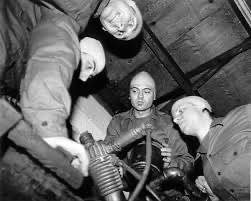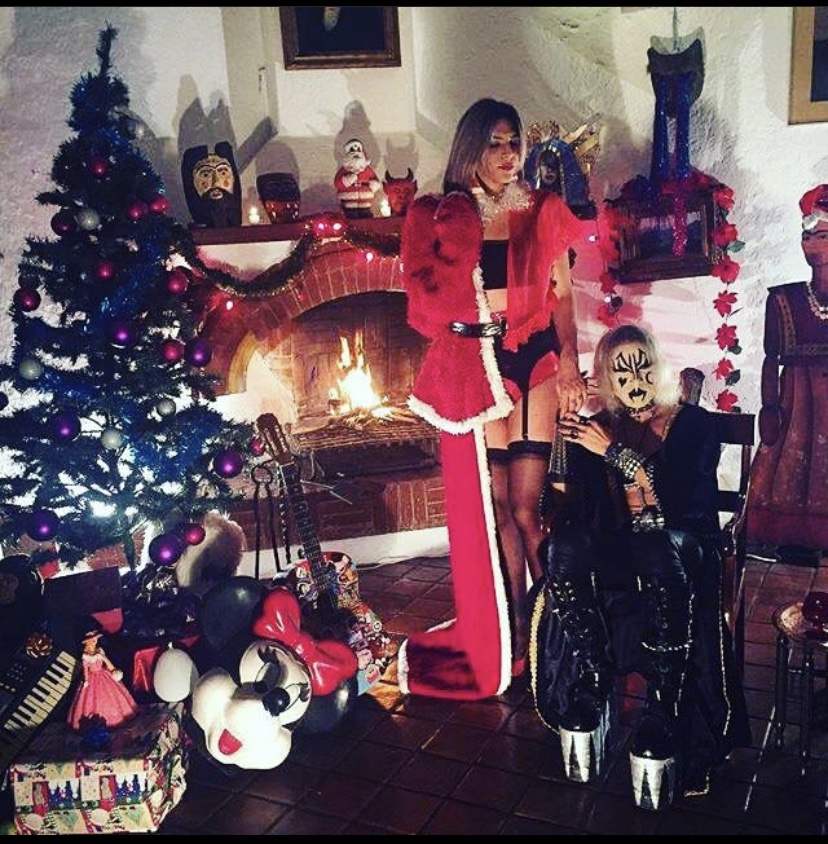If you are anywhere close to my age and consider yourself, as I do, a “scene historian” in any capacity I know of one special trick by which you can force yourself to feel something: important, useless, conscripted, powerless, misguided, etc. i don’t know enough about you to tell you which emotion will be triggered – only that I can promise with near certainty that one will manifest.
Ok, here’s the trick – consider the New York Time’s Bestseller Please Kill Me by Legs McNeil and Gillian McCain. Next consider that this milestone in rock journalism as oral history was published in 1996 and the roots of “punk”, according to the text, began to seriously gel with The Stooges and MC5 around 1970-ish. I’m not here to get pedantic or start any arguments about who wore glitter or pushed members of the audience first but rather put things in a temporal perspective: approximately a quarter of a century separates the first stirrings of proto-punk from the appearance of Please Kill Me on bookstore shelves around the world.
If, like me, you were traveling the country around the turn of the millennium to drink in the myriad ways that the worlds of underground art and music positively oozed raw creative energy you know that 1) things were just as vital as the punk scene lionized in Please Kill Me and 2) another 25 years later we’ve reached the perfect moment for a similar all-encompassing document as younger generations of kids, led to the tunes by music blogs, file sharing and algorithms, want all the mythology they can get their hands on.
The largest hurdle is the “umbrella problem” or, in simpler terms what to call it all. “Punk’” was the perfect word for a time and place, no matter how disparate various music under the banner may appear, and with the addition of “chain” and “egg” qualifiers many still claim punk with an “if it ain’t broke why fix it?” philosophy. The total cannibalization of the early nineties Seattle scene by A&R zombies screaming “grunge!” instead of “brains!” has left some reasonable reservations towards Greeks bearing gifts in the form of hyped up new genre names.
The last serious effort of this kind I remember seeing was Electroclash! and it predictably fell on its face. The new trend of constantly naming microgenres – Witchhouse, Sea Punk, Vaguewave, etc. feels more like a self referential joke than a serious marketing attempt – not to say it can’t sell records. I’d still like a catchy name that combines the tolerance for total artistic experimentation with the DIY ethos that colors the most compelling music of this era but may have to satisfy myself with something as simple as “noise rock”.
Anyway we’ve waded impressively far into this review without even a mention of the literary work that inspired it so now’s a good time to mention that Schneider characterizes Arab on Radar as “No Wave” – a more experimental and unapologetically art-inflected movement that predates punk. It is also important to look at Arab on Radar within the diverse experimental music landscape of Providence, Rhode Island. As a San Diegan I met my fair share of underground residents who idolized my hometown due to The Locust and other hardcore acts but in my own case I felt a special magnetism toward Providence.
If I’m going to be super technical things started for me with The Talking Heads, although they weren’t technically a RISD band, but Shepard Fairey would be a less tenuous starting point. By 1994 he’d moved to San Diego and assembled a powerful street team from my friends and acquaintances in the graffiti subculture. His Obey Giant stickers also began showing the influence of Russian Constructivism and as a dedicated fan I filled detailed notebooks with examples of every new design and color way – catalogued meticulously by location and date of collection.
The moment that turned Providence into a borderline religious pilgrimage destination came when I finally discovered that my favorite hand silk-screened mini comix and noise rock records were all pouring from a shared art space in a former mill called Fort Thunder. I called their phone, got permission from Jim Drain to move in and spent a month narrowly avoiding subjecting the FORCEFIELD performance costumes to my compulsive bed wetting before spending my twentieth birthday at a formative noise show.
I already knew the Arab on Radar guys before this. I saw them in at least two different colors of Dickie’s and hopped in their van earlier that year to ride along to Venice Beach. As a lifelong Californian it was a bit of culture shock watching pasty New-Englanders rub sunblock (I never touch the stuff) above denim cut-offs and buying matching Ray-Ban’s.
Let me put things a different way: every time friends have dragged me to an East Coast beach with grassy dunes and chilling breezes I feel a certain pressure to pretend to enjoy myself despite every single thing about the water, sand and general ambiance feeling “wrong”. Maybe some of the AoR crew were feeling the same and missing their flimsy wooden fences, salt grass and American beach grass.
Shifting back to music the only word for myself at these earlier stages was “fan”. I’ve read of near empty Fireside shows and hostile fans but can tell you with certainty that me and the Belden House crew brought the energy and enthusiasm at every show from 1999 to 2001. 21 and up was a different matter – I might have even gotten a roomie’s ID cut in half attempting to see the guys at The Empty Bottle.
One of my favorite bits was when Schneider placed the aluminum headstock of his Kramer, or other electric guitar with a strong neck, on the floor and swung forward in an arc with his stomach resting against the lower body. Total annihilation of rock instruments and proletariat bodies was the order of the day, not to mention conventional song structures, and I did my part by running at the old bowler’s benches and causing a complete flip when I threw my shoulder into the “ass groove” and launched my ankles skyward.
Besides buying Repopulation Program, You’re Soaking In It! and any other compilation I could find for Load or Providence I scooped up a vinyl copy of Rough Day at the Orifice. Along with the menacing high pitched guitars and frantic, confessional vocals I loved the pink sleeve design on brown cardboard and the tiny bits of hair Mat Brinkman had mixed in the printing ink. It almost looked like Andy Warhol’s prints with glitter or diamonds if the light hit things right.
Schneider talks about not signing with Load in the book and I do wonder how such a move could have panned out for them. Skin Graft, and then later 31G, seemed to be giving their all but would a local label have been able to give more support? As many great bands were on Load but nobody ever sold quite like Lightning Bolt, questions about relative sizes of fish and ponds are reasonable – there’s no easy answer.
It was always a riot throwing Rough Day on the family turntable and hearing my father read out the title in his Arkansas farm boy drawl. You wouldn’t be missing the pun or double entendre if he had anything to say about it – and he always did. Although I may have once and simply forgotten I really do regret not seeing the band with Andrea. I’ve played in only a couple of bands without women and it’s not something I’m looking to repeat.
The energy changes and I’m just not at home in a “guy van”.
My father, himself a complex discharge from the navy for insubordination, also got a real kick out of reading out the dirty song titles and lyrics. I went to Mr. Pottymouth’s poetry reading at Quimby’s and never felt too offended by the subject matter. When Joey Karam from The Locust started Le Shok with that one explicit record cover it always felt like they were low key biting AoR’s schtick – in a way that wasn’t especially shocking.
Maybe Eric Paul, aka Mr. Pottymouth, would cringe at the comparison but in recent years I’ve always thought of his former stage persona as a living avatar of Quagmire from Family Guy. (in terms of repressed New England sexuality, not his poetry skills). I actually wanted to talk about the working class and, for want of a better word, “townie” aspects of Arab on Radar. Schneider makes it clear that he and his band mates came up around Federal Hill, had family members connected to former mayor Cianci’s “Old Providence” and never quite fit in with the RISD and Brown students.
From my view across the country I never saw things looking too cliquey but there were clear cultural delineations between bands: On the “townie” side sits Sub-Pop signed Six Finger Satellite, Arab on Radar, Dungbeetle, Landed, Olneyville Sound System, White Mice, Curmudgeon Clique, perhaps 25 Suaves and assorted J./Jon von Ryan projects. On the art school side we start with Les Savy Fav, then Black Dice, Mudboy, Lightning Bolt, FORCEFIELD, Lazy Magnet, Kites, SHV, Russian Tsarlag and more recently Human Beast.
I don’t know enough about the early lounge/exotica movement to place anyone and even my favorite Providence folk duo, The Iditarod, is as much of a mystery in this regard as Amoebic Ensemble. It’s hard to know every tiny detail about a city you only slept in for three weeks – even if you’re as big of a nerd as I am. The class struggle bits are not to talk shit but instead an overly simplified attempt to pick Arab on Radar apart and see what made them tick.
The death of the trades, the entitled attitudes of art school kids and a constant feeling of “impostor syndrome” in the world of experimental music could account for some of the shoulder chips but not all of them. If Schneider is to be believed good old fashioned sexual frustration filled the balance. Even with a national roadmap to the finest purveyors of extreme European pornography and a religiously followed rotation as to who cranks the hog in what order when in hotel bathrooms it seems like nothing could effectively stem the pressure.
Imagine bailing out a sinking boat but the boat is full of mayonnaise that pours down the leg of some terrycloth shorts and you start to get an idea. Sometimes the simple act of release takes on the dimensions of a Herculean Labour. In these sections Schneider starts to almost read like Peter Sotos and it’s entertaining enough. In contrast to the old saying that “an army travels on its stomach”, Arab on Radar appear to have done so on their nutsacks.
Despite the constant urges Jeff and his band mates behaved respectfully to any female artists, promoters and traveling mates they accompanied except for one exception. The Need was an experimental metal band from Olympia, WA who happened to be lesbians and something caused Jeff to view them as a band “that put identity above music” and even blame them for the disappearance of free thought in the music underground.
Perhaps being a little younger, growing up in California instead of New England and identifying as a feminist my whole life shifted my views on lots of this stuff. I never once considered The Need an overtly political or identity centered band. They were a shredding guitar band with innovative upright drum parts and vocal melodies and the fact that I wouldn’t get attacked for my colorful eye makeup watching The Need but would seeing death metal heavyweights Nile (ironically if you know how ancient pharaohs wore makeup) was simply a bonus.
It sounds like someone from AoR was defacing The Needs’s posters when touring ahead of them and a small verbal altercation ensued. For those that didn’t tour in 99/2000 posters in a venue was all the promo you had unless a weekly ran an ad or blurb. Schneider is a therapist now so maybe he’s made some progress on this.
Most ironic is that while complaining that The Need were “political” and “pushed identity”, Arab on Radar did the exact same thing in a different way. As a working class band in a scene dominated by art school kids their plumber style uniforms were a statement of class struggle and a clear message that they held more in common with the workers stocking green rooms with band’s rider cheese and veggie plates than the entitled would-be “rock stars” throwing this shit out the window.
Enough of that. Let’s break this rock music autobiography down in terms of what the public expects in books of this type:
1) SEX – all the frustrated masturbation you could dream of. One band member suffers family loss and drowns the emotions in all kinds of women. I thought it odd that Schneider hints at every member dallying with a fifteen year old girl but himself – did he abstain or is he being discrete for his wife’s sake? Glass houses and all… Some band business conducted in peep shows and strip clubs is vividly described.
2) DRUGS – mostly absent. Plenty of weed is smoked and sometimes it fucks with guitar playing. If the hard stuff shows up I blinked and missed it. Probably for the best – the last thing the kids need is another Please Kill Me telling them they can’t be authentic punks unless they pick up a needle but if you only read rock bios for dope and coke stories this ain’t for you. Someone trips and has a bad time in Dunkin’ Donuts.
3) ROCK N’ ROLL (aka FIGHTING) – According to the book these guys grew up rough and the move to cerebral art rock didn’t slow them down any. Best section for this stuff is definitely an early Marilyn Manson gig in Rhode Island. Disgruntled fans learn how far the opening band (AoR) can be pushed. Not too far it turns out. I seem to have forgotten a knuckle duster or two – more surprises for you when you read it!
Finally, should you read this book? Absolutely! While primarily focused on his own band Jeff clearly cares quite a lot about music and documents 94 – 02 Providence, and the national underground circuit, perfectly. His views on squat houses (and their watered down spaghetti) are hilarious and it’s definitely a fun day or two of reading with no lags. Plenty of super funny random anecdotes out of left field.
The biggest tragedy of the turn of the millennium underground is that everything was being documented on early websites and hosting services like Angelfire. That’s all gone now and lost to the ether. If a service is free you’re the product and our burgeoning scene stopped being profitable for our digital “hosts” a long time ago. Something to remember when entrusting our content to Facebook, X, Instagram and my own reliance on WordPress. Shit, I really need to make a backup.
Anyway it’s a minor miracle that Jeff remembered as much as he did, took the time to write it up and even created a printing house for himself and other voices. These kinds of efforts need to be lauded and supported.
They’re all we have and when Instagram, Facebook and others eventually shutter their virtual doors Psychiatric Tissues will still be a physical book with no wi-fi or web hosting required.
That said, if you are a close AoR fan left lost and angry from the divorce and want to know why Mommy and Daddy don’t love each other no more this is not the book for you. Something ego – Something substance problem – all super vague. Fans closer to the 2002 breakup and failed 2010 reunion might see more in these passages than I could. Eric, the singer’s, testimony might be more detailed but less believable. Couldn’t say.
I prefer to remember how things were that last night I saw them on Oops! Tour in 2002. Knitting Factory in Hollywood! Tried to bring my insane homeless friend but se said it sounded “really annoying!” Arab slayed! Bolt slayed! Locust slayed! Hella’s not really my jam.
Anyway it was a nice note to go out on!


